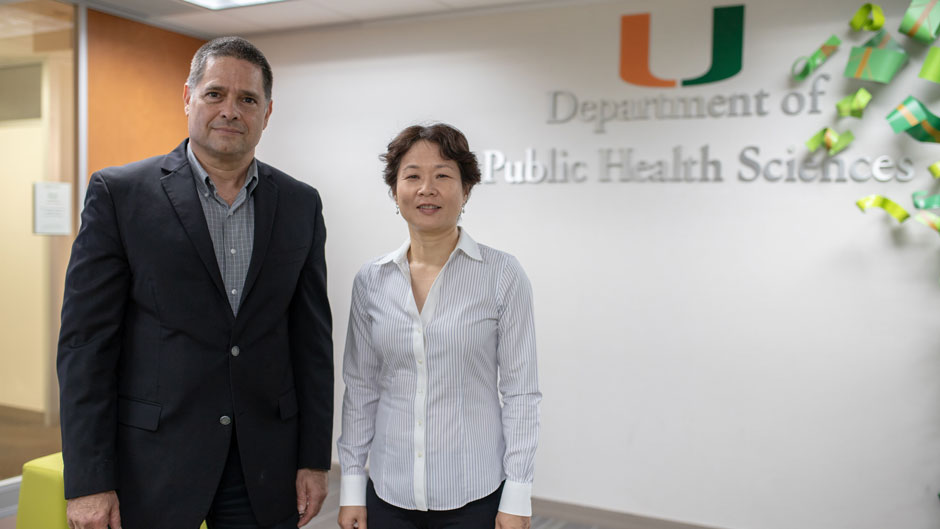When Diane Zheng was a teenager growing up in southern China, she watched as her grandmother’s personality faded and transformed as a result of Alzheimer’s disease. Then, in recent years, the pain resurfaced as her family watched her father-in-law deteriorate and eventually pass away from the same disease.
Both of these experiences prompted Zheng, a fifth-year epidemiology Ph.D. student, to wonder about the factors that may affect cognition, which is the brain’s ability to orient, reason, comprehend and to remember information. Diseases such as dementia and Alzheimer’s rapidly affect cognition, which Zheng observed firsthand.
“I could see how a person changed,” Zheng said. “You become a different person when you lose your cognitive ability, and it becomes quite a burden on people who take care of them.”
Zheng had always been intrigued by cognition, but when she graduated from the University of Minnesota with a master’s degree in Biostatistics and became a senior data analyst at the University of Miami Leonard M. Miller School of Medicine, her job pushed her to delve into research on vision under David Lee, a chronic disease epidemiologist in the Miller School. After more than 10 years of working together, where Zheng demonstrated her aptitude for complex statistics, Lee encouraged Zheng to pursue a Ph.D. in public health.
During a longitudinal research class a few years ago, Zheng came across the opportunity to pair her interests of vision and cognition. Zheng used a data set that tracked more than 2,500 seniors living in Salisbury, Maryland, and monitored their vision and cognition for eight years. Applying newly learned analysis methods, Zheng was able to find that as vision declines in old age, so do a person’s cognitive abilities. She also uncovered the idea that vision has a stronger influence on cognition than the other way around, which was the first time this type of association had been reported. Her findings raise the possibility that taking care of your eyes can reduce the rate of cognitive deterioration in older adults.
“Scientists are studying different ways to slow down cognitive decline, but this is one way we can—by maintaining good vision in older people,” Zheng said.
Zheng’s paper, which was coauthored by Lee and Dr. Byron Lam, an ophthalmologist at UM’s Bascom Palmer Eye Institute, was published in the Journal of the American Medical Association’s June Ophthalmology issue. It also received an editorial in the publication, praising Zheng for her contribution to the field, which is a rare honor, Lee added. Then this summer, several dozen news outlets from around the world wrote articles citing Zheng’s research.
And in November, Zheng will receive an award from the American Public Health Association’s Vision Cares Conference for her paper. The Morton Silverman Outstanding Student Award is given to a student who has contributed significantly to improving the field of eye care through a paper or project.
“To this day, there’s been a sense that taking care of your vision is somehow less important than attending to other health issues, but [this] paper shows you cannot ignore ocular health because it is essential to healthy aging,” Lee said.
Although Lee said Zheng has always had a strong ability to unravel data, she was able to build upon that knowledge as a graduate student, which helped her paper garner such thorough findings. In 2016, Zheng received a prestigious F-31 grant from the National Eye Institute, which allowed her to work with an expert from Purdue University to develop her analysis skills even more. This has helped her with the paper she already published, and Zheng’s dissertation, where she is researching a link between vision and chronic conditions, such as diabetes, hypertension, or arthritis.
“As people are living longer, they often have multiple conditions, and many of them seem to cluster together, like diabetes and hypertension, so we are looking at how they affect vision and how they affect quality of life and even risk premature mortality,” Zheng said.
Zheng is hoping to finish up her dissertation this spring to graduate with her Ph.D. in May, but she wants to keep exploring the role of vision on a person’s health.
"This paper has continued to motivate me to research this topic, and I hope it'll open more doors for research collaboration," Zheng said. "I'm thankful for the opportunity to continue working on my research interest during my graduate study and for the mentoring I got from my department."

